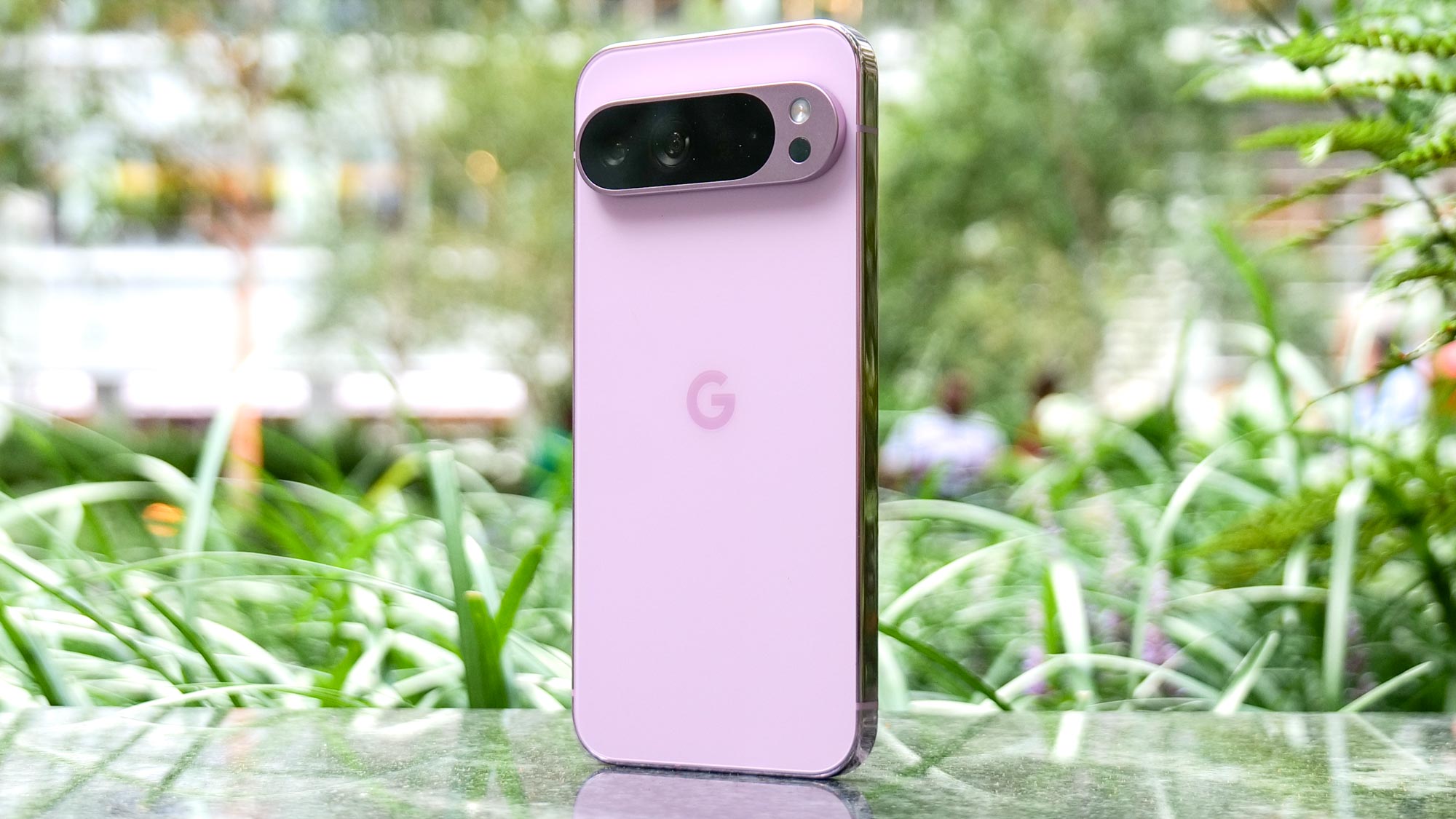
Something different happened last fall. For the first time in a long time, I made a Pixel phone as one of my daily drivers — and it’s a decision I don’t regret after putting the Pixel 8 Pro through countless photo shoot outs and comparisons against all the best phones around. Now that its successor is finally here, I have high expectations for the Pixel 9 Pro XL.
That’s because the Pixel 8 Pro stuck around for almost a year, even when newer Android phones like the OnePlus 12 and Galaxy S24 Ultra tried to tempt me away from it. Google’s rearranging its Pixel lineup because instead of just one flagship model, we’re getting two ‘Pro’ models instead. Technically speaking, the Pixel 9 Pro XL is the direct successor to the Pixel 8 Pro because of their similar sized screens — whereas the Pixel 9 Pro has a much smaller display. I break down all the details about them in my Pixel 9 vs. Pixel 9 Pro vs. Pixel 9 Pro XL comparison.
Given the popularity of the iPhone 15 Pro Max and Galaxy S24 Ultra, Google’s arming the Pixel 9 Pro XL with bigger upgrades like newer cameras, more helpful AI features, and a stronger, more durable design. In my Pixel 9 Pro XL review, I’ll see if it’s a worthy update that could convince people to choose it over rival phones.
Google Pixel 9 Pro XL review: Specifcations
Google Pixel 9 Pro XL review: Price and availability
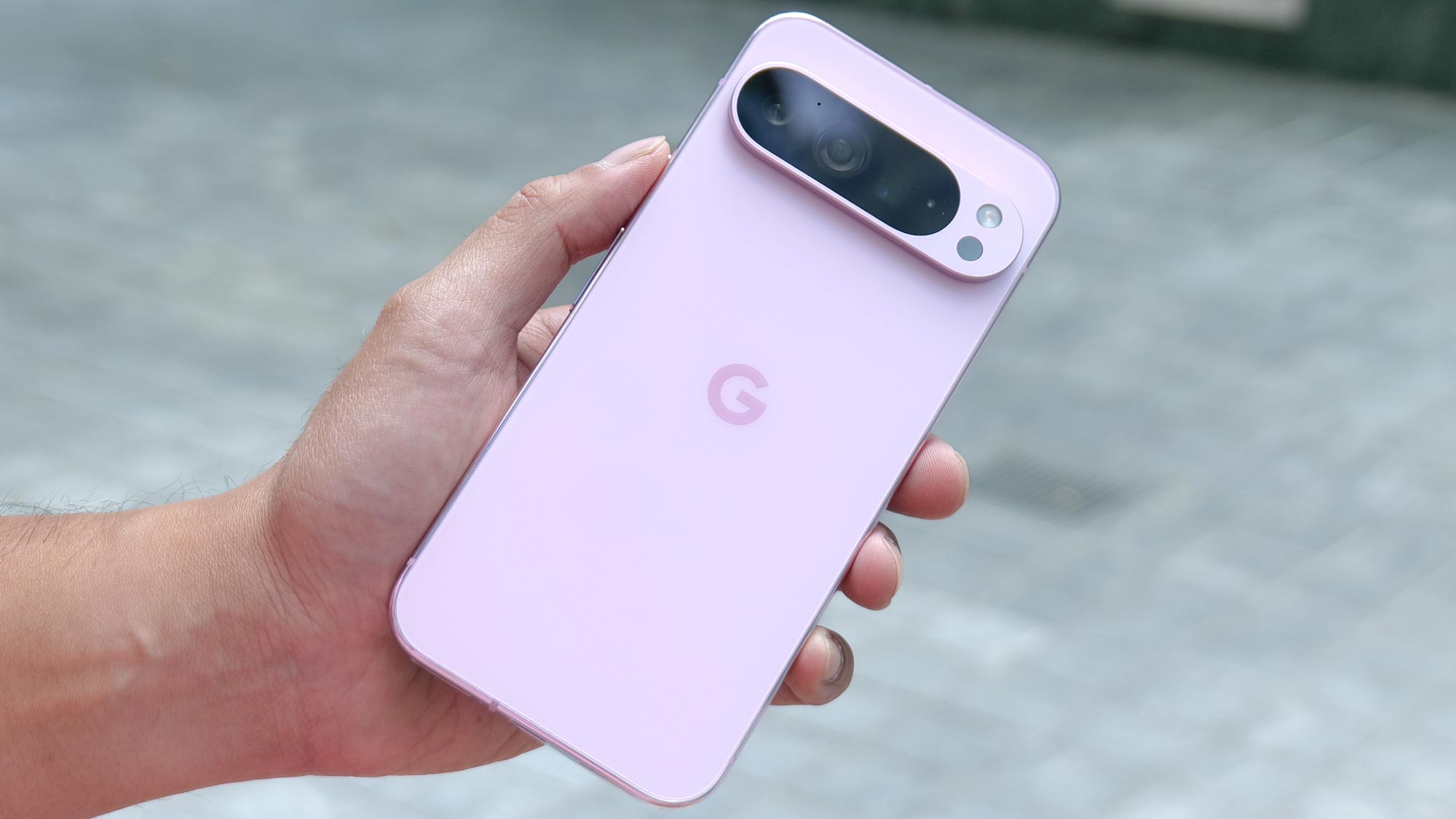
Frankly, I’m annoyed that we’re getting back-to-back price hikes because the Pixel 8 Pro launched at $100 more than its predecessor last year with its $999 starting cost. And now with the Pixel 9 Pro XL, it’s up by yet another $100 to a starting price of $1,099 in the US. This effectively ends one of the best parts about getting a Pixel phone: their discounted prices. In Australia, the Pixel 9 Pro XL starts at AU$1,849.
Pixel 9 Pro XL preorders are available right now, with steep discounts on the flagship phone when you do a trade-in. Although, it’ll be available online and select retailers starting on September 4.
There’s a total of four colors at launch: obsidian, porcelain, hazel, and rose quartz. I do miss the bay option for my Pixel 8 Pro, but I do like the rose quartz color of my Pixel 9 Pro XL review unit because of its lighter tone. I'm really annoyed that the base starting storage is still 128GB.
Google Pixel 9 Pro XL review: Design
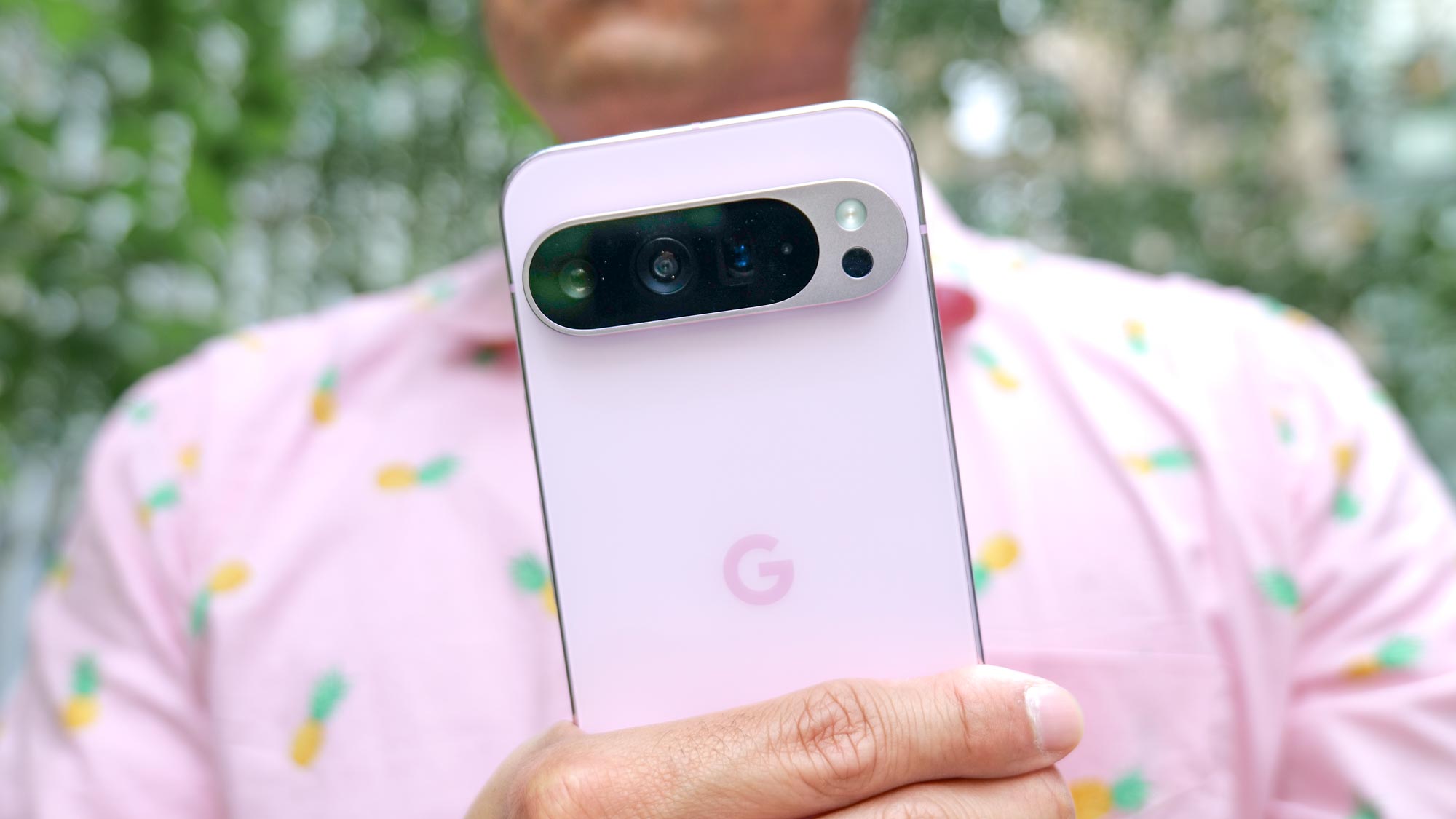
First and foremost, I love the redesigned camera hump on the back of the phone because it’s much more pronounced than ever before. The elongated pill shaped protrusion is a departure from the edge-to-edge camera bar in past Pixels, but it’s exactly what it needs to set it apart from other phone designs.
Apart from the camera arrangement, the design of the Pixel 9 Pro XL makes it look eerily similar to the iPhone 14 Pro Max due to the polished metal trims that are now flat as opposed to contoured. I know others may like this change, but it doesn’t feel as comfortable to hold as the rounded edges of the Pixel 8 Pro — so it’s something I’m just going to need to get used to.
Despite this, at least it’s still sporting the same matte glass surfaces as before to give them that always clean, smooth look. Google claims that the design is twice as durable as the Pixel 8 Pro with its IP68 construction, especially with Corning Gorilla Glass Victus 2 protecting its screen.
Google Pixel 9 Pro XL review: Display
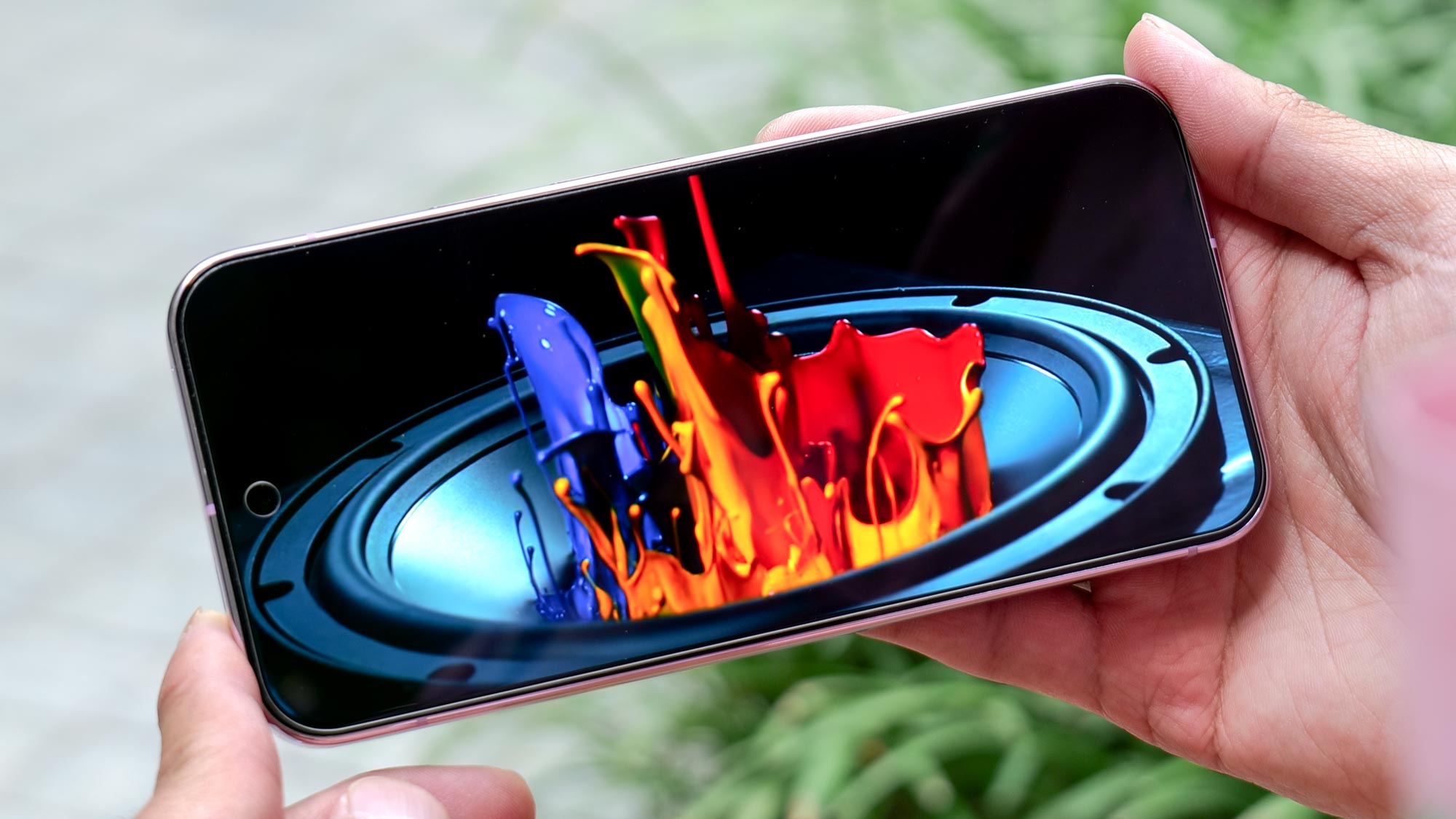
During its Made by Google event, the company made an outrageous claim that the Pixel 9 Pro XL’s 6.8-inch Super Actua display reaches a peak brightness of 3,000 nits. I didn’t think it was ever going to get close to that in our testing, but I was mistaken.
Hands down, the Pixel 9 Pro XL has the brightest screen we’ve ever tested — reaching a blinding peak of 2,469 nits, a substantial improvement over the 1,526 nits of the Pixel 8 Pro. And you know what? It shows outside when I play the same 4K HDR clip, with the Pixel 9 Pro XL being noticeably brighter than the Pixel 8 Pro.
But it doesn’t end there either because this OLED panel looks marvelous with its rich color tones and wide viewing angles that barely show any distortion when I look at it from an angle. This record breaking mark is hard to believe, more so when rival phones like the Galaxy S24 Ultra tops out at 1,326 nits.
Google Pixel 9 Pro XL review: Cameras
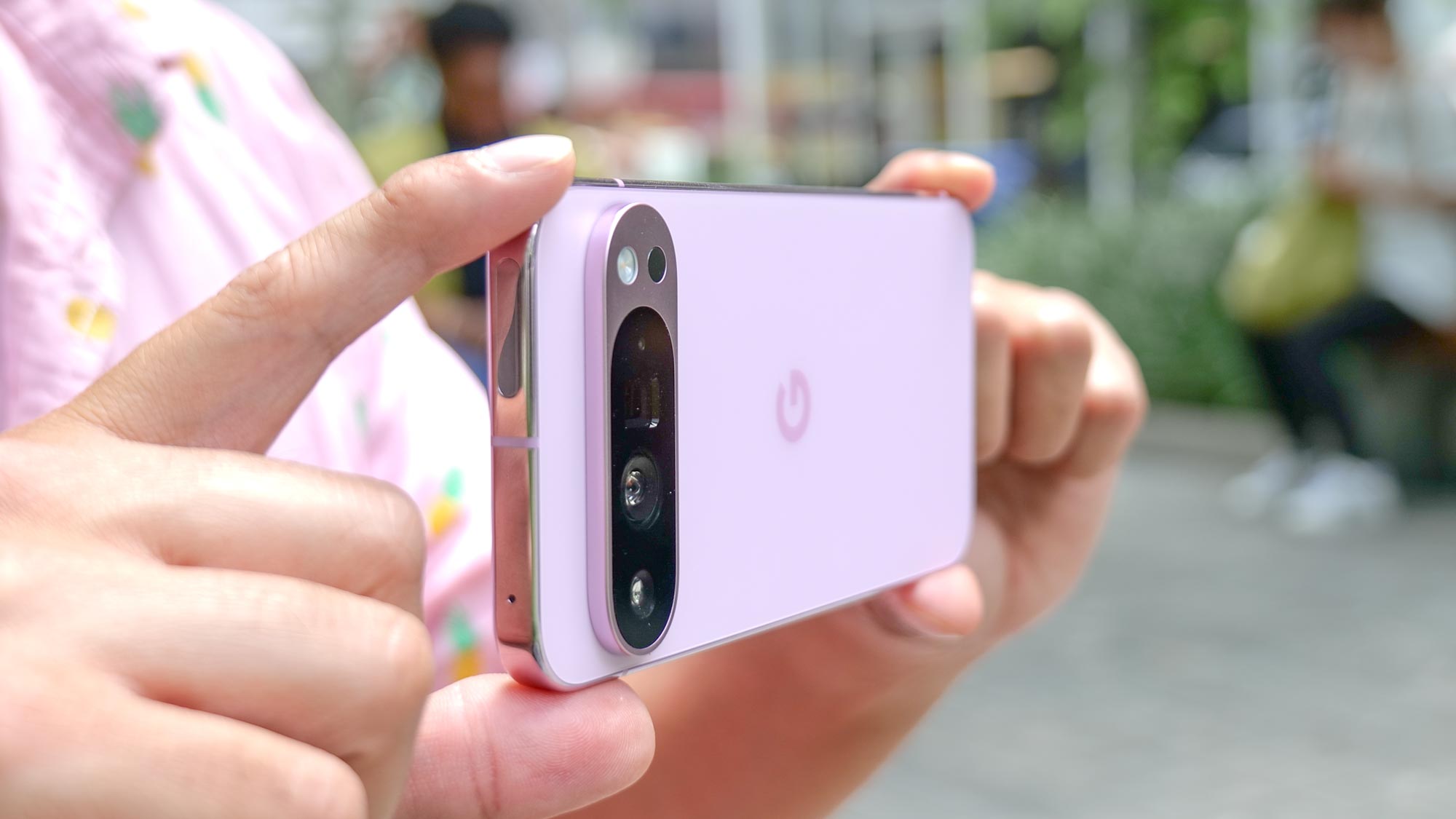
I’m starting to believe that phone makers are leaning on software more so than the hardware to propel their cameras — and the Pixel 9 Pro XL is proof of this. That’s because its triple camera system consists of a 50MP main camera, 48MP ultrawide, and 48MP telephoto with 5x optical zoom. Technically speaking, the main and telephoto cameras are identical to Pixel 8 Pro. However, the ultrawide benefits from a wider f/1.7 aperture (versus f/1.95 with the Pixel 8 Pro), which makes it more suitable for low light.
While the rear cameras are similar for the most part, it’s the selfie camera that gets the biggest upgrade — a pixel crunching 42MP autofocusing front camera with a wider 103-degree field of view. I won’t spill the beans on how it performs just yet, but it’s undoubtedly a big upgrade if you intend on using it a lot.
Meanwhile, the camera interface is just as intuitive and robust as ever before. Since it’s a ‘Pro’ model, shutterbugs like myself appreciate the Pro Controls that let me dial in a few of the camera settings manually. The only new changes include the Add Me feature, which leans on AR-guidance to let the photographer be included in the shot — along with how panoramic photos are taken.


Starting off with the 50MP main camera, I honestly don’t see any differences against the Pixel 8 Pro. With the shot I took of the American Radiator Building from Bryant Park, it shows off the excellent dynamic range performance of the Pixel 9 Pro XL — especially in how it handles the shadowed areas of the nearby trees. Against the Pixel 8 Pro, I’m hard pressed to even realize which is which because they produce the same results.
Against the iPhone 15 Pro Max, the snapshots above at a park might look similar in how they both do an excellent job with the contrast of the light and shaded areas — but it’s only when I zoom into the photos that I see the iPhone 15 Pro Max pulling in the slightly sharper image. It’s only noticeable with the leaves around the bench in the foreground.
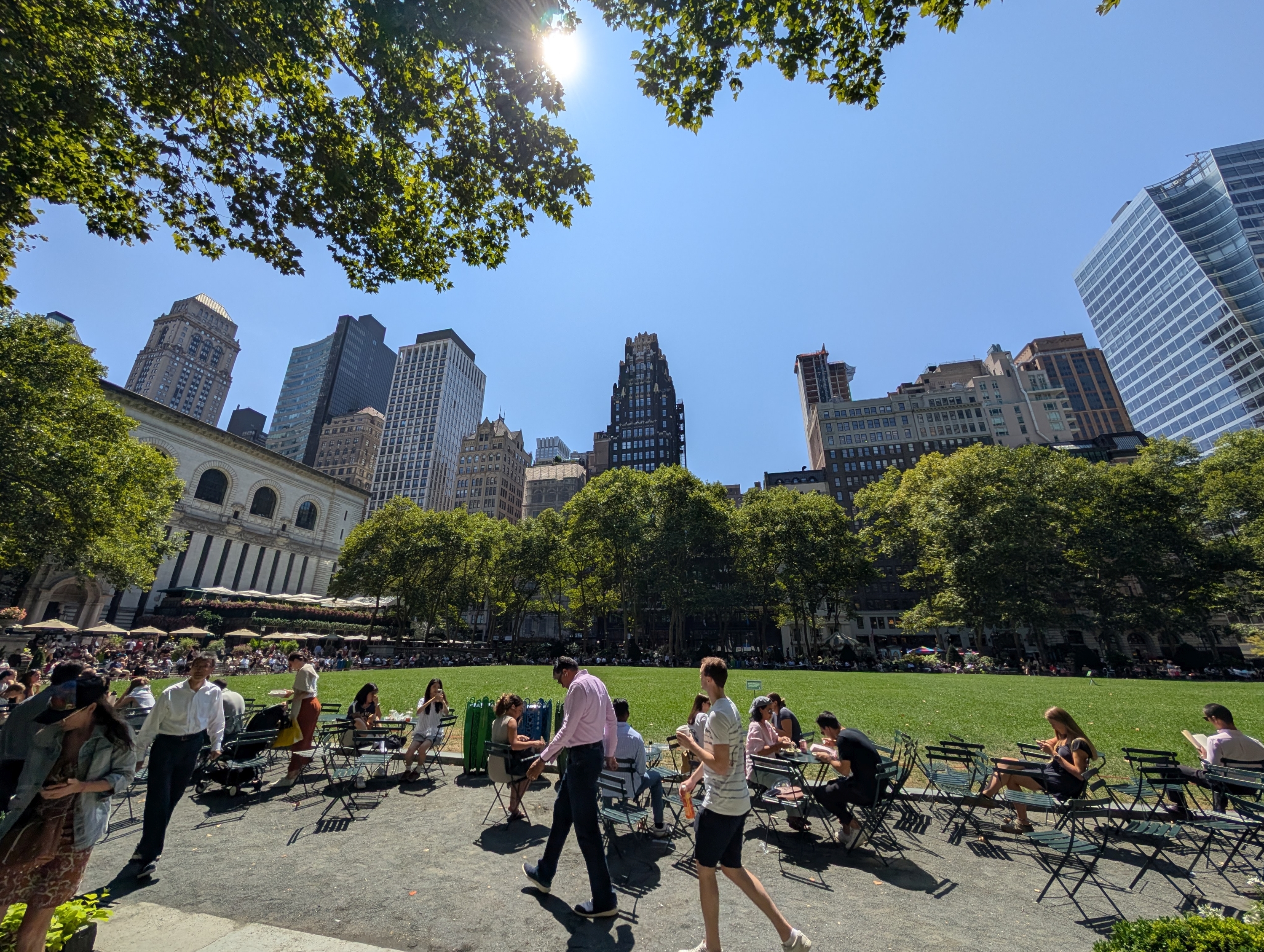

Sticking with the same location at Bryant Park, there’s definitely a bigger improvement with the Pixel 9 Pro XL’s upgraded 48MP ultrawide camera. Even though it has a narrower 123-degree field of view (126-degree FoV with the Pixel 8 Pro), its f/1.7 aperture draws in more light to better expose those same shadowed areas in the shot.
Macro mode automatically kicks in whenever I get close to a subject with the Pixel 9 Pro XL. Using this pink flower to compare against the iPhone 15 Pro Max, I’m giving it to Apple because it produces a brighter image with more definition in the details. It’s hard to see unless you zoom tightly into the petals around the flower. It’s a close one — but the Pixel 9 Pro XL falls a little short.
The selfie camera has the biggest upgrade, thanks partly to the new 48MP sensor and wider 103-degree field of a view. As a result, it captures much more detail in my face compared to the softer tones of the Pixel 8 Pro — like the texture of my shirt and other beauty marks around my face.
At 5x zoom, the Pixel 9 Pro XL doesn’t show any meaningful improvements against the Pixel 8 Pro. If you look closely at the tree in the middle of the shot above, they both capture the details of the tree’s bark and branches. The only reason why I prefer the Pixel 9 Pro XL’s image is how it pulls in better dynamic range performance and how the leaves and branches appear brighter.
Interestingly enough, Google’s doing something extra to boost the Pixel 9 Pro XL’s performance at 30x zoom. Whether it’s newer image processing algorithms or something else, it’s giving the sign in the shot above more sharpness and clarity.
There’s a slight shift in how panoramas are taken with the Pixel 9 Pro XL, as it adopts a new process that involves me pointing the camera at specific dots on the screen and holding it still there for a little bit. Even though I prefer the fluid panning action of the Pixel 8 Pro, the newer Pixel’s implementation delivers better results. Not only is it a brighter image, but the exposure throughout the shot is much more even than the Pixel 8 Pro.


Things get much better under low light, as the Pixel 9 Pro XL’s Night Sight Panoramic shot really does boost the overall quality. Side by side, there’s no comparison as the pitch dark setting of my backyard draws out much more detail — like the brighter detached garage in the background.
And speaking of low light, I was itching to see bigger gains out of the Pixel 9 Pro XL, but they’re minimal at best. Against the iPhone 15 Pro Max, it does a better job at exposing the shot above. The room’s almost pitch dark in them, but yet the Pixel 9 Pro XL makes it look like there’s some ambient light hitting the plants on the shelves. I will say that they both capture fine details like the textures of the walls and wooden shelves, but it’s just the boost in exposure that pulls the Pixel ahead.
Against the Pixel 8 Pro, it also applies more exposure to the shadows in the shot above of a tree in my backyard.
Another reason to choose the Pixel 9 Pro XL is because of its ability to shoot at up to 8K 30FPS — whereas the previous Pixel 8 Pro caps out at 4K 60FPS. On one hand, I like the extra utility of 8K recording because it gives me more playing room to edit videos by cropping them or adding digital pans/zooms in my video editing software, but you’ll need a high-performance machine to handle them.
If you want the best quality, however, you’ll want to set Video Boost mode on because of the improved exposure and contrast it delivers. Even though it takes time for the final video to process, which involves uploading the original clip to Google Photos and then downloading the optimized one, the result makes the clips turn out much better. It might be tough to discern in the clip above on a sunny day down by 33rd street in New York City, but it’s much more noticeable with Night Sight Video.
In the original clip I shot at my backyard, it was filled with a lot of distracting noise, but Night Sight with Video Boost removes them — while also applying extra brightness in the process. I just wish that these results could be achieved locally on the phone, rather than waiting with all the processing and uploading.
Overall, it’s a modest improvement, but I don’t think it’s enough to convince existing Pixel 8 Pro owners to switch — especially with the main and zoom cameras. However, the new photo editing AI features could be enough to convince others, which I’ll elaborate in the software section.
Google Pixel 9 Pro XL review: Performance
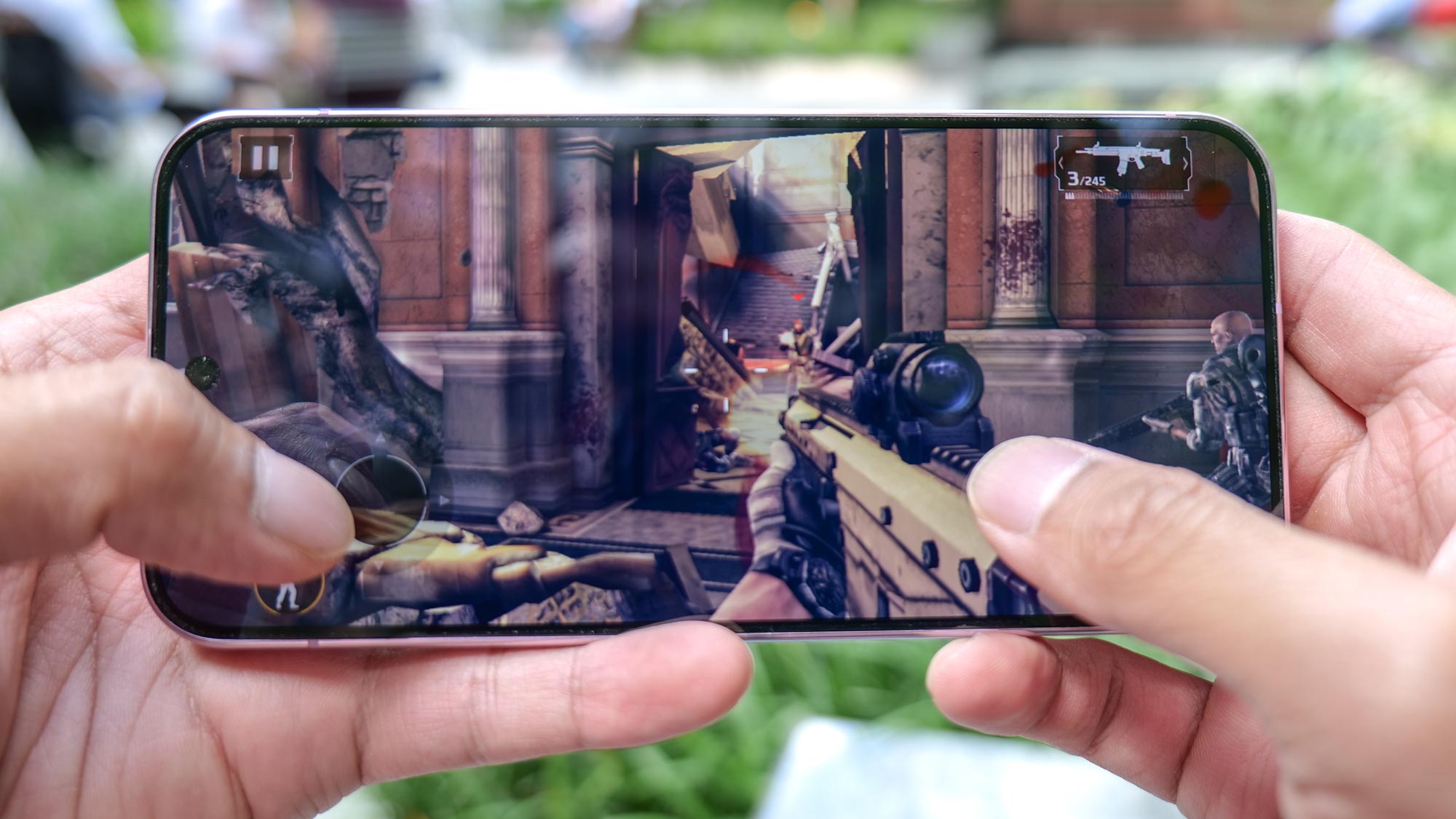
The biggest area of opportunity for the Pixel 9 Pro XL is without a doubt its processing performance, mainly because last year’s Tensor G3 underperformed against rivals chips like Apple’s A17 Pro and Qualcomm’s Snapdragon 8 Gen 3. With the Tensor G4 calling the shots, it’s an improvement over the Pixel 8 Pro — with GeekBench single and multi-core scores averaging at 1,929 and 4,747 respectively.
On paper it beats the Pixel 8 Pro’s scores of 1,699 and 3,666, but it trails the performance benchmark results of the iPhone 15 Pro Max and Galaxy S24 Ultra. Despite this, I’m happy to report that its performance is buttery smooth and responsive with all the normal functions I do on my phone.
I’m also pleased by how it manages to keep more apps in memory with its upgraded 16GB of RAM, which means less refreshing if I’m multitasking.
Over on the graphics performance side of things, it’s a minimal gain running 3D Benchmark’s Wild Life Unlimited test to see how its GPU handles. Its 55.63 fps score is well in line to what I expect out of a flagship device, but it’s barely an improvement over the Pixel 8 Pro’s 52 fps score.
And compared to the Galaxy S24 Ultra and iPhone 15 Pro Max, the Pixel 9 Pro XL doesn’t come close to matching their insane frame rates. But don’t let GPU performance tests be the single determining factor because I loaded up Age of Origins and Modern Combat without any hitch to either of their performances — even when there’s a lot of action happening.
Google Pixel 9 Pro XL review: Battery life
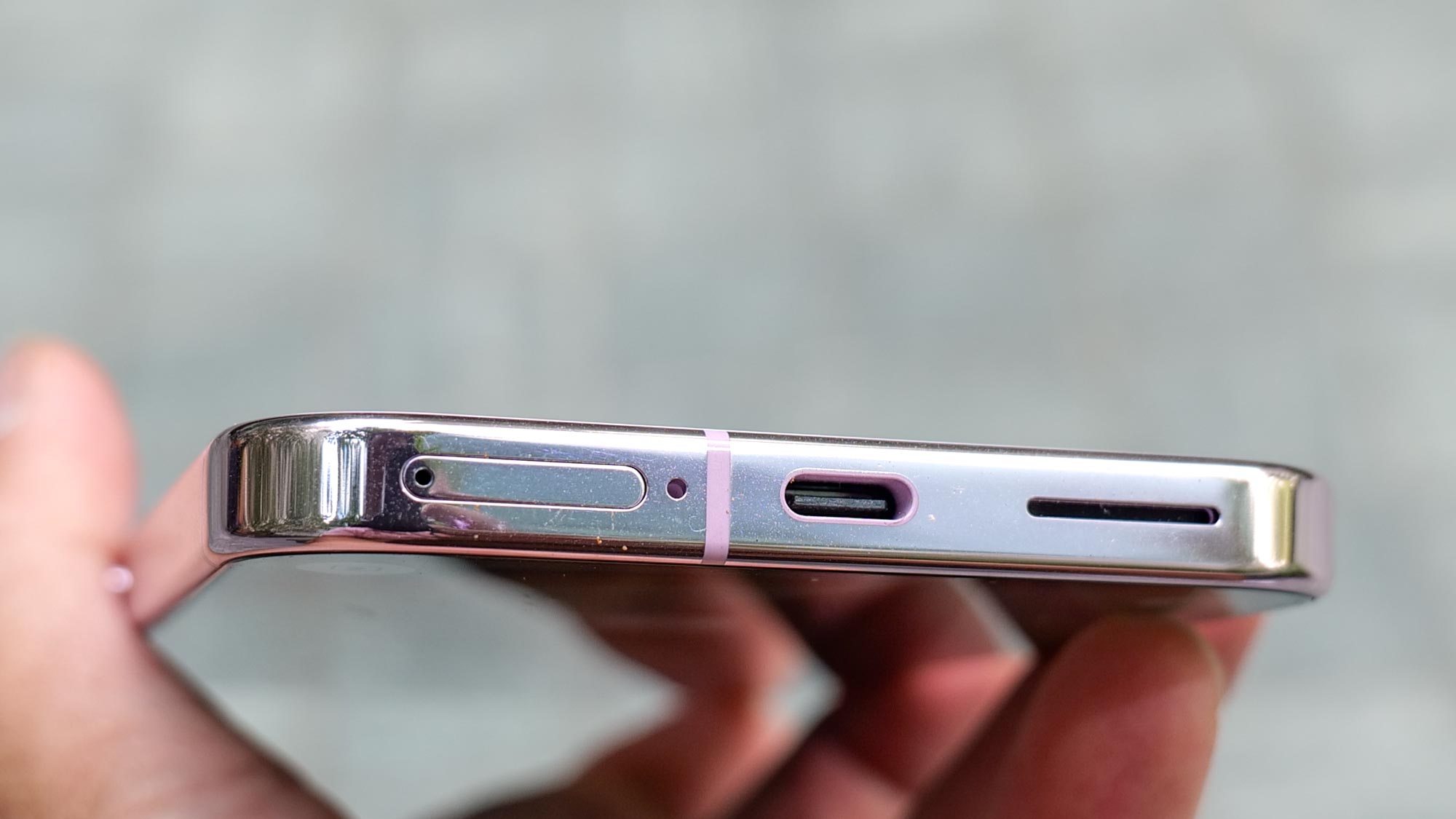
The Tensor G4 might not be the speediest piece of silicone on the market, but it’s certainly bringing along improved power efficiency. That’s because the Pixel 9 Pro XL has a 5,060 mAh battery, which is marginally better than the Pixel 8 Pro’s 5,050 mAh one. Given how the Pixel 8 Pro came up short at 10 hours and 3 minutes in Tom’s Guide’s battery benchmark test, I’m impressed that the Pixel 9 Pro XL beats it in stunning fashion clocking in at 14 hours and 37 minutes at its longest.
This is the kind of leap I want to see in any successive device, so I’m delighted that we finally have a Pixel with extraordinary battery life. It has taken years to get here, but it’s lasted me easily through a day with little worry. In fact, it hovers around 15% battery life each night right before bed time. Battery life is a key area people look at when buying a phone, so it’s long overdue that a Pixel can finally keep up with the competition.
On the flip side, the Pixel 9 Pro XL also gets a boost with faster 37W wired charging — which is slightly up from the Pixel 8 Pro’s 30W charging. This results in getting a 63% charged level in 30 minutes of charging, while the Pixel 8 Pro got to 59%. However, wireless charging is still capped at 15W with the use of a 2nd Gen Pixel Stand and a slightly slower 12W speed with Qi wireless charging.
Google Pixel 9 Pro XL review: Software
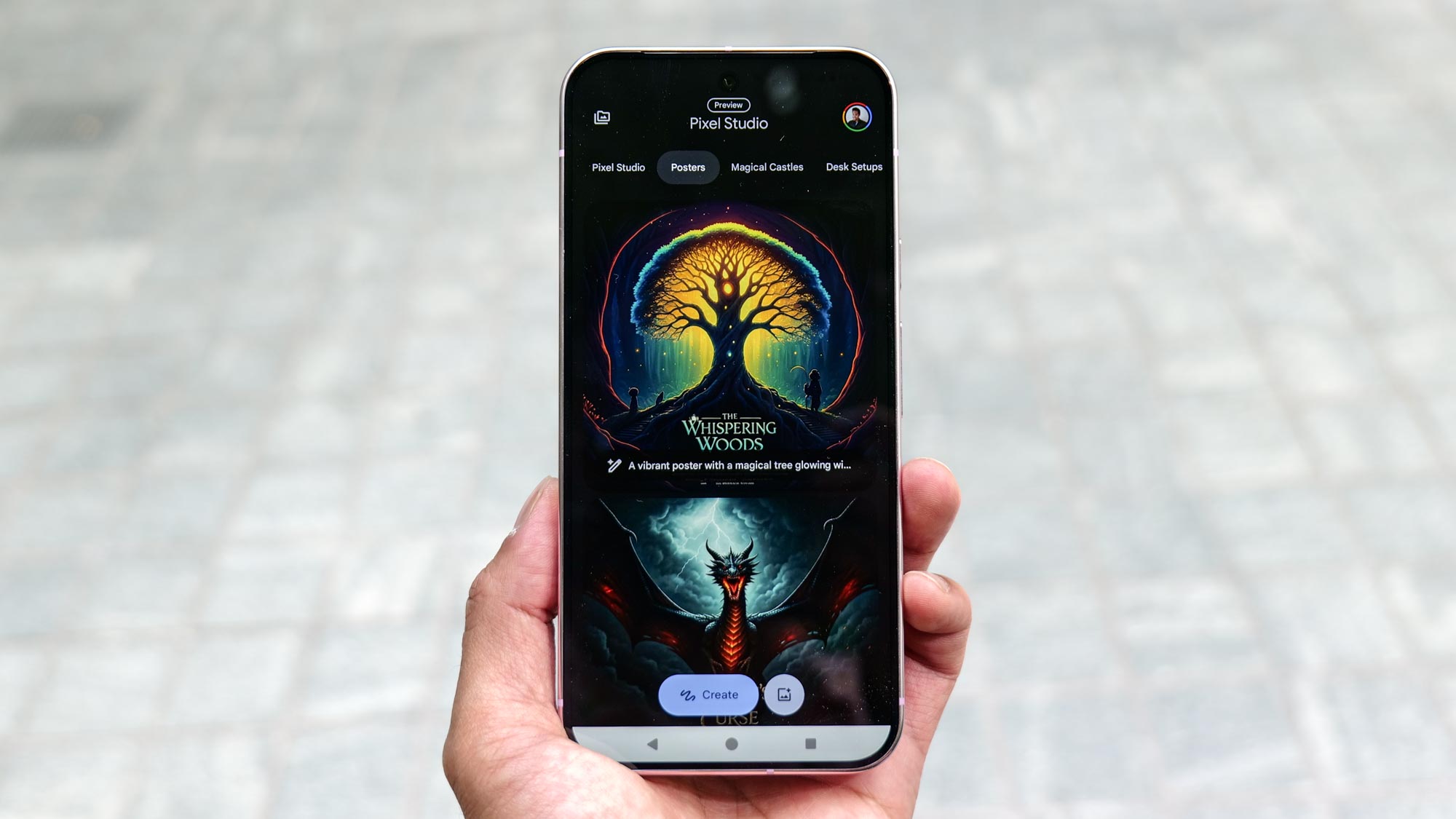
Usually Pixel devices launch with the latest version of Android, but Google’s choosing to launch the new Pixel 9 lineup with Android 14 as opposed to Android 15. I know there are people who are on the fence about this decision, but I’m not. Yes, there are certainly new features that accompany Android 15, but the new exclusive Pixel features are enough to tide me over.
Of course, AI features play a huge part in Google’s phones — and the Pixel 9 Pro XL is no exception. While it doesn’t gain as many features as what the Pixel 8 Pro introduced, I do like how the majority of them have a practical purpose. Here’s all the new AI feature:
Google Pixel 9 Pro XL review: Gemini Live
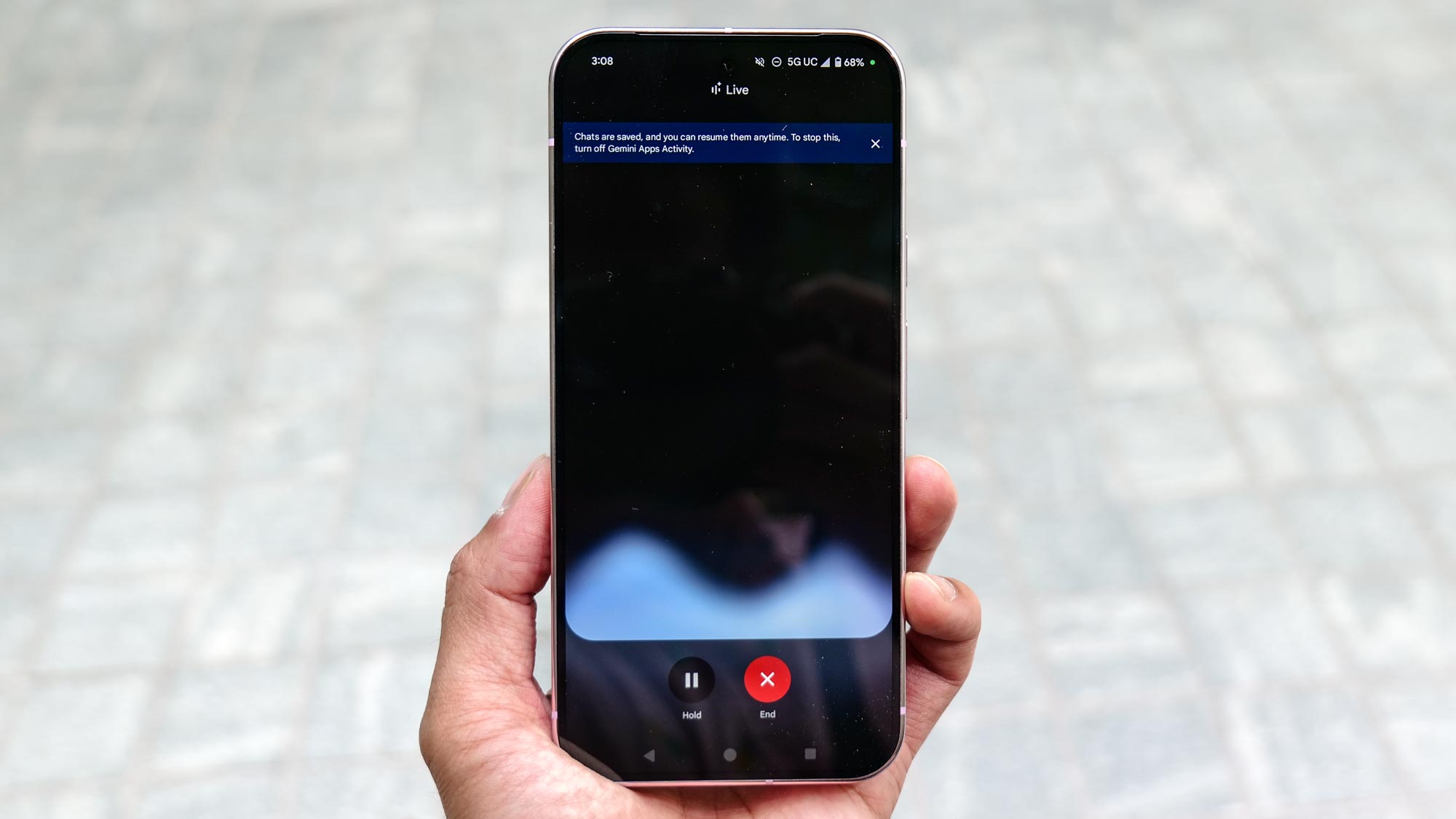
First of all, Google Gemini is the virtual assistant that handles everything on the phone — from asking it to create a list of places to visit on your vacation, to controlling your favorite smart home devices. What’s even better is that I can access Gemini Live by pressing on the corresponding button in the Gemini app. What I’m impressed most about Gemini Live is the assistant’s ability to handle natural conversation, like when I ask a follow up question while it’s speaking. It’s even better that it sounds like I’m having a conversation with an actual person.
Google Pixel 9 Pro XL review: Add Me


Getting assistance with augmented reality, the Pixel 9 Pro XL’s new Add Me feature lets me take group photos with the photographer stitched into the photo later. Essentially, you take one photo then the Pixel 9 Pro XL guides you to take the second one — with prompts to move closer or further so that the two shots are lined up correctly. Once the second photo is snapped, it then merges the two with help from AI to produce the final photo. I’ll admit that it works flawlessly in the photos above that I used to magically add me.
Google Pixel 9 Pro XL review: Reimagine
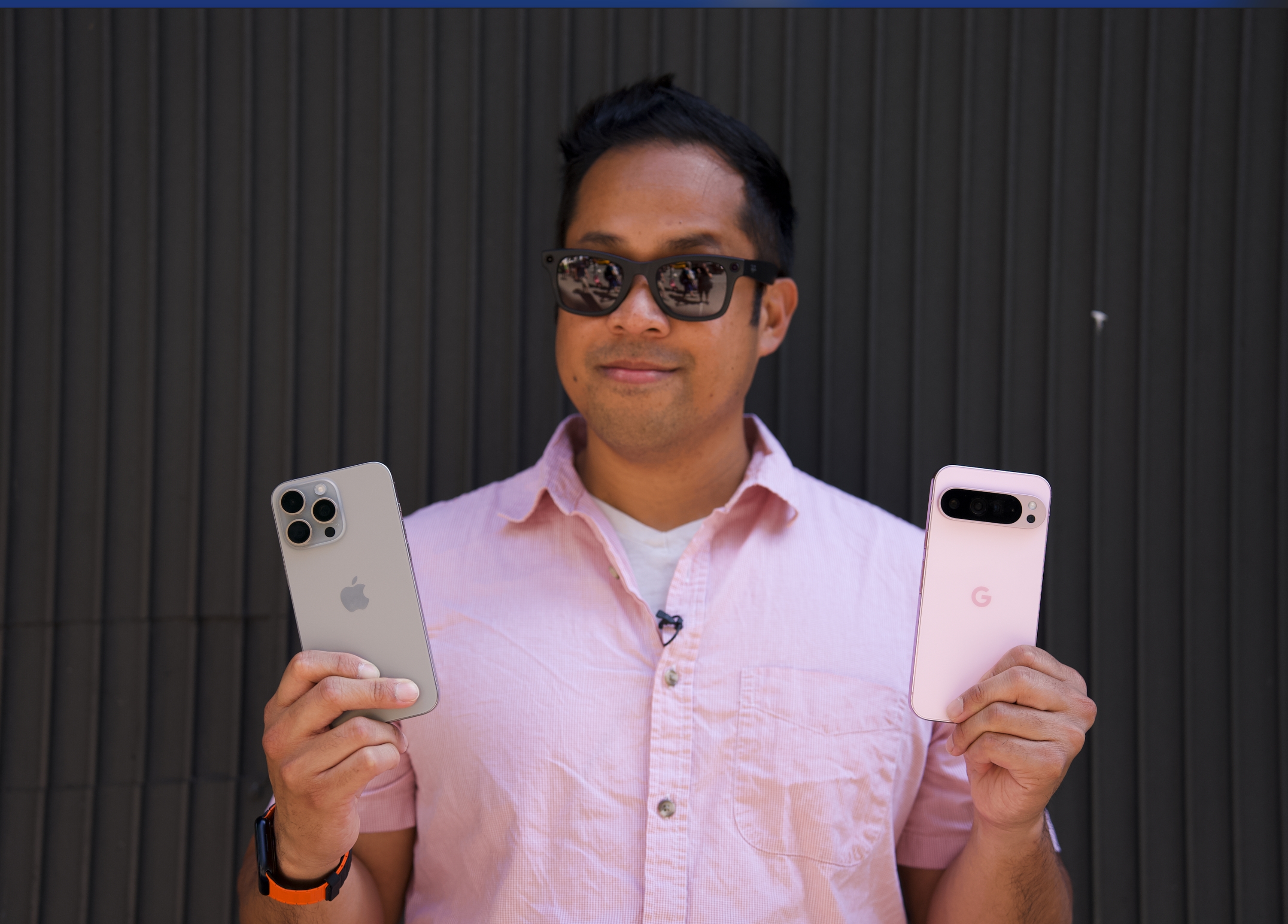
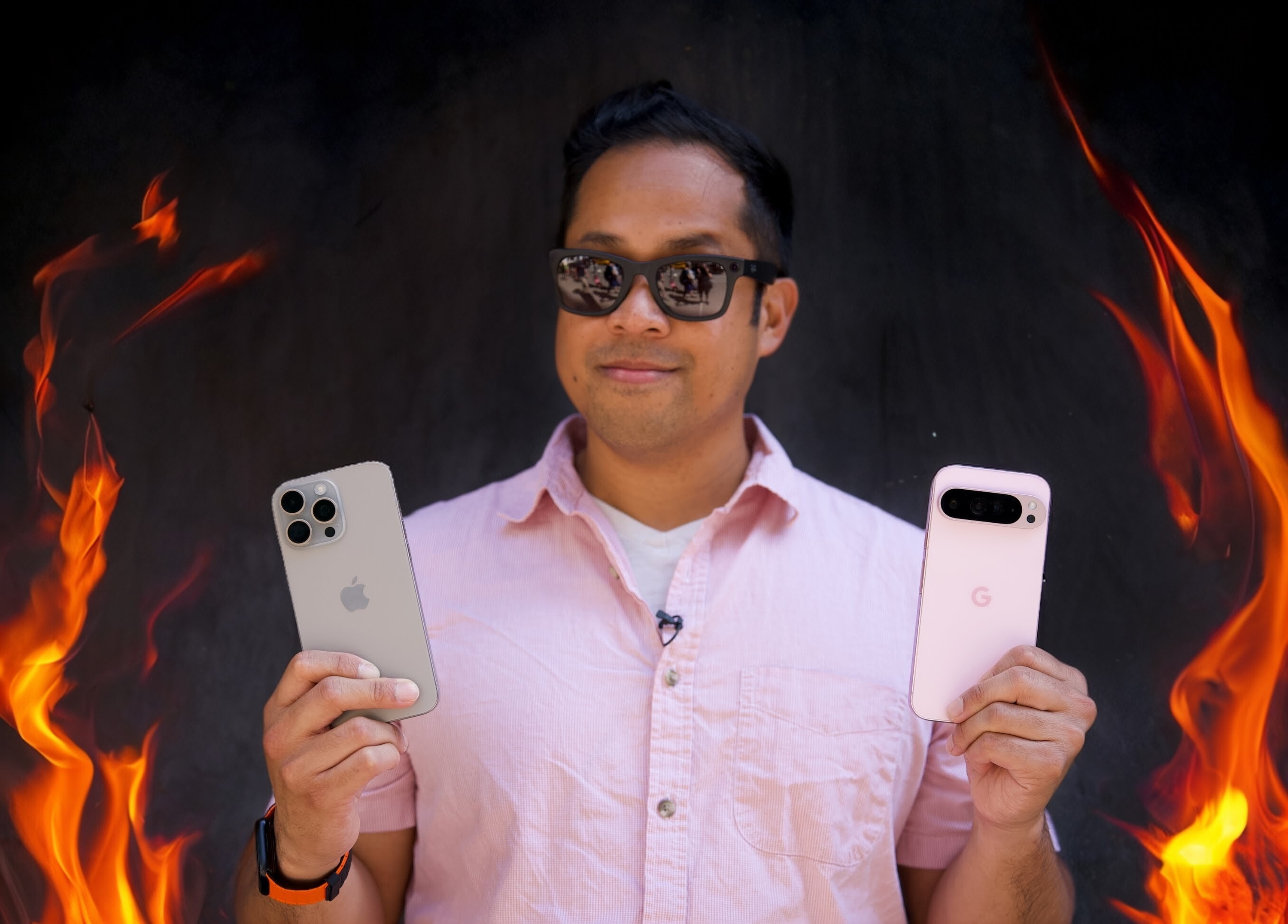
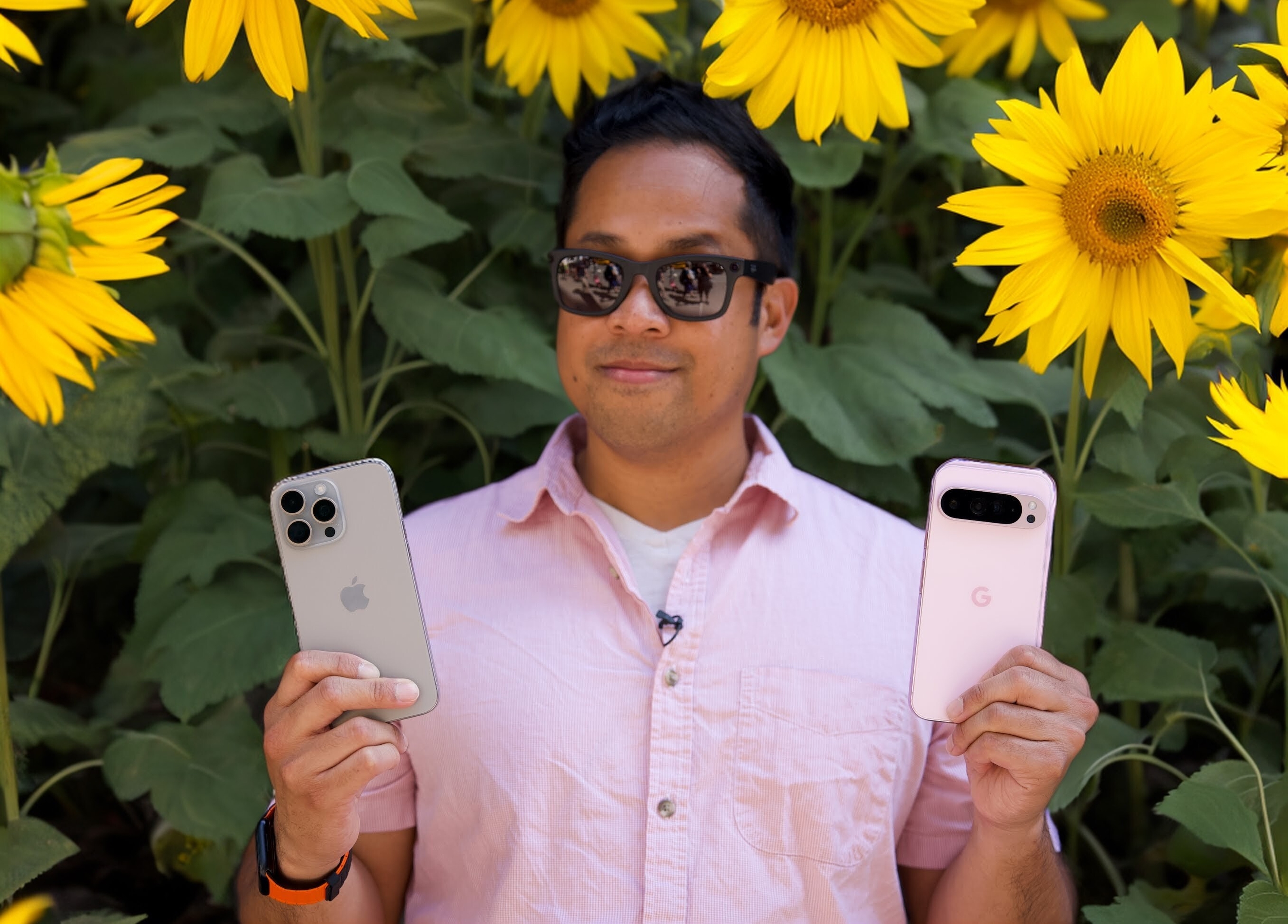
Technically a new feature within Magic Editor, I love how the new Reimagine feature uses generative AI to tweak my photos. It works best on backgrounds, which I used to change up the shots with the photos above. By writing down my request in a text box, I’m surprised by how it generates the new set of images in less than 4 seconds. While it does accurately produce what I want, it can still occasionally mess up — but it works nicely for the most part. The first image is the original one in the gallery above and the rest are generated with the Reimagine feature.
Google Pixel 9 Pro XL review: Pixel Studio



Pixel Studio uses a text box to generate new images and sketches based on my description. I asked it to make an image with “black cats fighting against teenage mutant ninja turtles on the beach,” and I’m astonished by what it produces. Yeah, I get a good chuckle from all of them, but it was super quick at generating the images. No other phone currently offers anything similar to this out of the box, so it’s a tool I can see myself using.
Google Pixel 9 Pro XL review: Call Notes
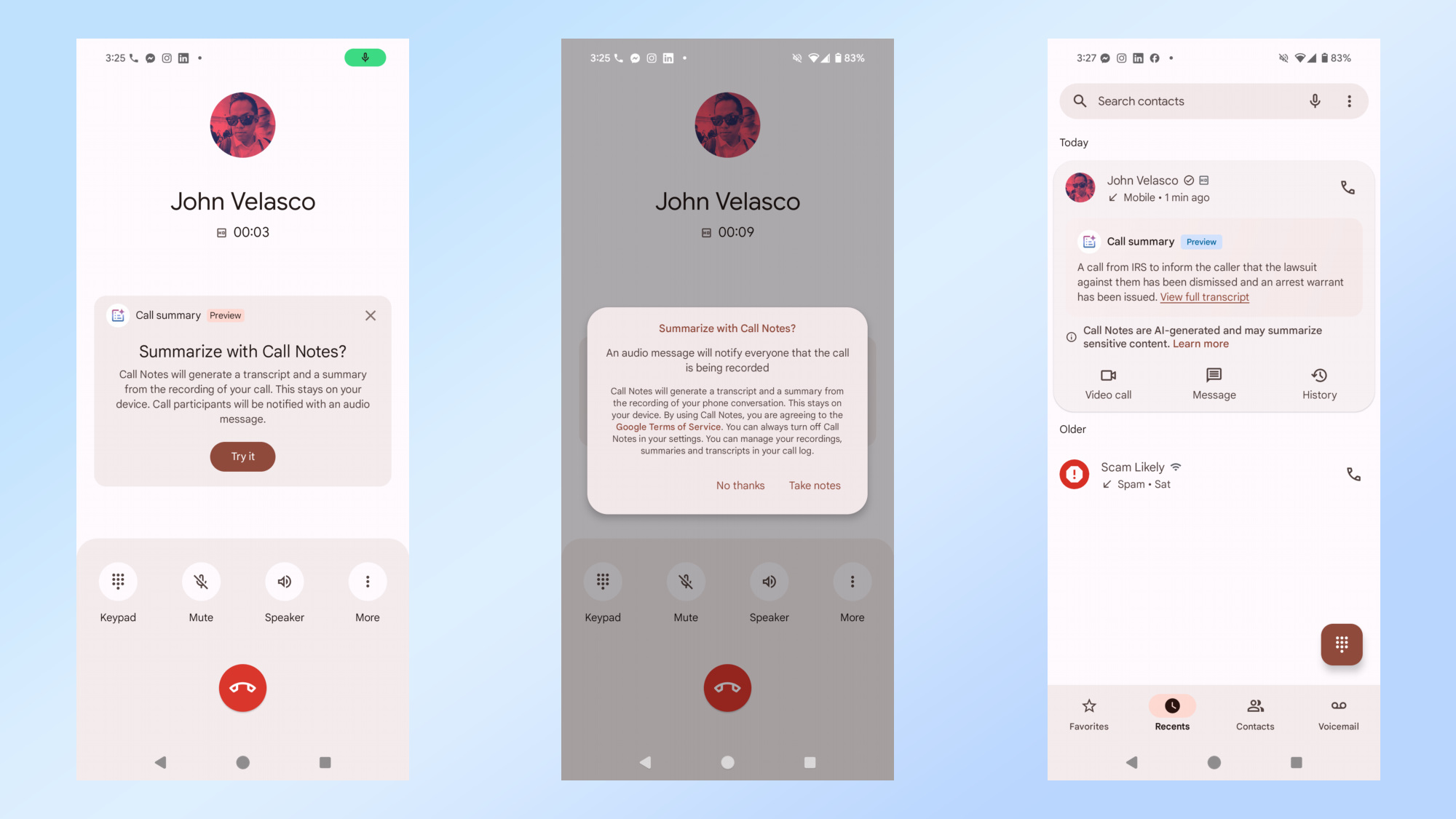
Call Screen has been one of my favorite AI features with the Pixel 8 Pro, allowing Google Assistant to take phone calls on my behalf, but the Pixel 9 Pro XL gains the added convenience of Call Notes. Essentially, it records your phone calls and then creates a summary about it — which is swell if your short term memory isn’t that great. I find it useful because I’m not forced to jot down notes while trying to comprehend the nature of the call. Not only do I get the transcription, but I also like how it intelligently summarizes the call.
Google Pixel 9 Pro XL review: Pixel Screenshot
And finally, the last feature you should know about is the Pixel exclusive Screenshot app. I’m still on the fence about using it as much as the other features, mainly because it involves taking a lot of screenshots. It basically leans on AI to analyze the contents of your screenshots, so it can recall them later on. For example, I used Pixel Screenshots to look up the price of a hard drive that was emailed to me. It pulled it up quickly and answered my question about the price. But again, for this to work effectively long term, I need to constantly tell myself to take screenshots.
All of these features amplify the software in these two phones, even though it's launching with Android 14 instead. Thankfully it won't be long before it comes out. Despite this, the Pixel 9 Pro XL is still get the same outstanding 7 years of major software and security updates that make Google’s phones prized in the space.
Google Pixel 9 Pro XL review: Verdict
Clearly there are improvements with the Pixel 9 Pro XL. Apart from its brighter display and longer battery life, everything else about the Pixel 9 Pro XL feels like it’s a modest upgrade at best — which is made tougher due to its $100 price increase.
While the new AI features are helpful, I was hoping for bigger improvements around its camera and processing performance. Given that the Pixel 9 Pro has the same exact camera arrangement as this, there isn’t much justification on picking the Pixel 9 Pro XL for photography. And compared to its direct rivals, the Galaxy S24 Ultra and iPhone 15 Pro Max, they definitely cost more but have better performances overall.







